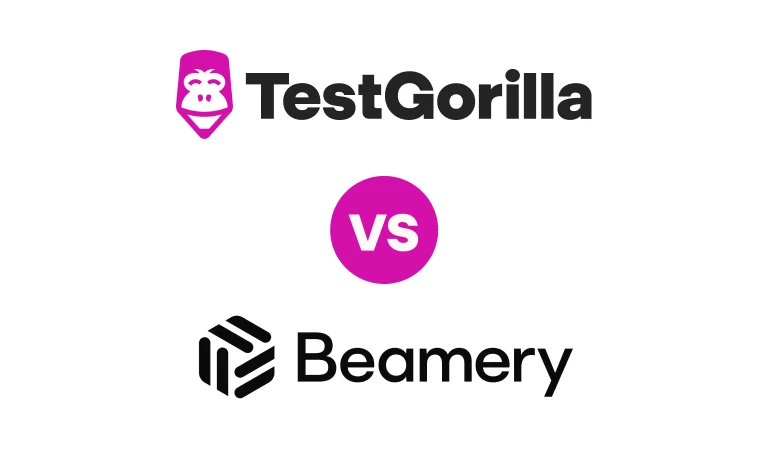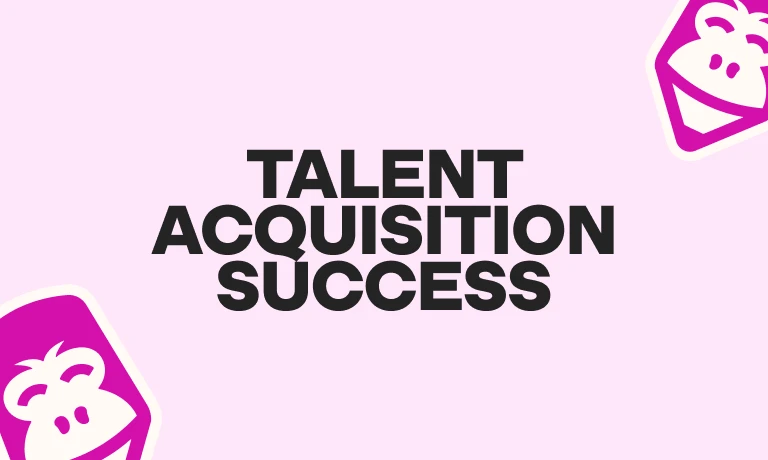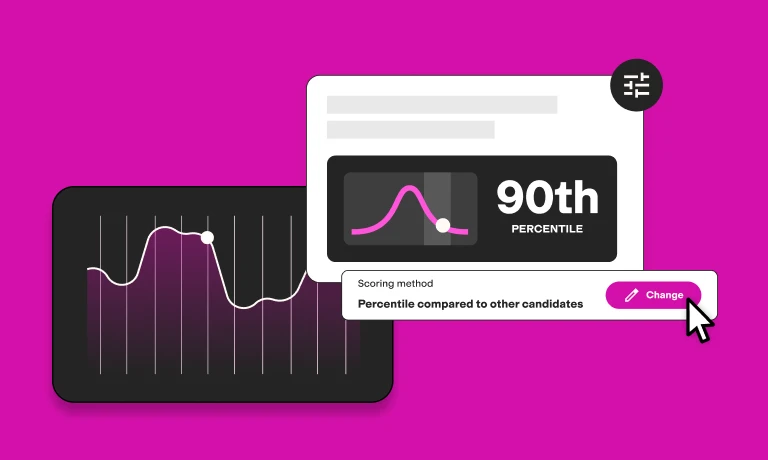How to attract and asses Entertainer (ESFP) candidates during the hiring process
ESFP candidates have team spirit in spades, with their energetic, spontaneous, and sociable natures. However, these same qualities can cause them to get quickly bored at work and struggle to follow through with long-term plans.
Placing an ESFP candidate in a role that doesn’t align with their strengths can contribute to employee dissatisfaction and turnover, costing your business precious time and money.
Luckily, various talent assessments can offer further insights into candidates’ strengths, weaknesses, and abilities, helping you match them with the perfect role. This boosts employee morale while enhancing retention. In this article, we explain the distinctive characteristics of ESFP candidates based on the 16-type personality test. Plus, we discuss how you can best attract ESFP applicants during recruitment and share strategies for effectively assessing these candidates.
ESFP Candidates: Key strengths, limitations, and personality traits
According to the 16 personality types framework, ESFPs are extraverted, sensing, feeling, and perceiving. This means they tend to be sociable, spontaneous, and emotionally attuned.
Also called Entertainers, they bring high energy and a positive attitude to any setting. Their enthusiasm for socializing and shared activities makes them excellent team players. Not only are they comfortable being the center of attention – they’re also adept at reading a room and responding to others’ emotional states.
These Entertainers contribute a variety of strengths to the workplace:
Interpersonal skills. ESFPs are naturally empathetic and attuned to others’ emotions. Their adeptness at initiating conversations and forming connections is great for team dynamics.
Sense of fun and spontaneity. Their infectious positive outlook makes them natural motivators and contributes to a lively workplace atmosphere. Their ability to motivate and energize others can make them great charismatic leaders.
Adaptable and flexible. ESFPs work well in dynamic, rapidly changing environments that require spontaneous decision-making. These qualities help them navigate uncertainty and face new challenges head on.
Team players. These candidates thrive in team environments, excelling at supporting their teammates and contributing to a collaborative work culture. ESFPs’ enthusiasm and positive attitude are useful dynamics for motivating others.
Creativity. With an appreciation for aesthetics and a strong sense of creativity, ESFPs can engage in out-of-box thinking and innovative problem-solving. This can bring fresh perspectives to issues.
Bold. ESFPs aren’t afraid to step out of their comfort zones and can achieve impressive outcomes as a result.
However, you should be mindful of potential weaknesses in ESFP candidates:
Conflict avoidant. While ESFPs thrive on collaboration, they don’t like conflict and often remove themselves from a situation to avoid it – even if this means crucial issues remain unresolved.
Difficulty executing long-term plans. ESFPs’ love of spontaneity can result in rushed decision-making, making it challenging for them to focus on and execute long-term plans.
Easily bored. Seeking out variety and engagement, ESFPs can become bored with routine or repetitive tasks. They may also struggle with remote work due to its lack of physical variety and social interaction.
Highly sensitive to criticism. ESFPs can take feedback personally and react emotionally to it. This can impact their ability to process constructive feedback.
For a more in-depth understanding of ESFP candidates, the results of a 16-type personality test provide deeper insight into their energy sources, decision-making, and workplace behaviors.
What ESFP applicants look for in a workplace
Entertainer candidates possess distinct traits that can guide their preferences when seeking an employer and workplace.
A vibrant company culture
ESFPs thrive in lively work environments where creativity is valued. They’re attracted to workplaces with vibrant cultures.
To convey this to candidates, consider mentioning aspects of your workplace culture in your job advertisements or showcasing them on your company’s social media accounts.
Opportunities for social connection
As natural socializers, ESFPs enjoy connecting with people in the workplace, including their colleagues, managers, and broader professional networks.
Highlight networking opportunities, staff retreats, or family days in your job advertisements to attract ESFP candidates who value interpersonal relationships.
Job variety and flexibility
ESFP candidates are drawn to roles that offer a mix of tasks and a degree of flexibility. They excel in fast-paced work environments where they can engage with diverse challenges and responsibilities.
Be sure to emphasize these aspects of the role in your job description, including the dynamic nature of the role and the need for creative problem-solving and quick thinking.
An engaging recruitment process
Their desire for variety and excitement means ESFPs are more likely to participate fully in an engaging recruitment process. Look for ways to make your recruitment as candidate-friendly as possible to stand out from other employers.
You could achieve this by using pre-employment tests (including personality tests), role-playing during interviews, and conducting meet-the-team interviews with shortlisted candidates.
Aesthetic working environments
ESFP candidates are visual people. They’ll take note of a work environment and appreciate visually appealing workspaces.
Do you have open-plan offices, break-out spaces that allow employees to socialize, or plants around the office? Social media is a great way to showcase your physical workplace for prospective ESFP candidates.
The best insights on HR and recruitment, delivered to your inbox.
Biweekly updates. No spam. Unsubscribe any time.
How to assess ESFP-type candidates
When assessing ESFP-type candidates, you must explore several factors to understand their strengths and areas for development. While personality tests offer useful insights into candidates’ workplace preferences and behaviors, you shouldn’t rely on them alone when making hiring decisions. Instead, use a combination of pre-employment tests to gain a deeper understanding of individual applicants’ job-related skills and abilities – and to see whether they’ll thrive in your workplace.
A skills-based approach to hiring is the best way to ensure a fair and objective process. Here are some ways you can enact this approach.
Skills-based tests
TestGorilla is a talent assessment platform that has hundreds of tests you can use to assess your candidates. These include technical, cognitive ability, and personality tests. The platform gives you the ability to merge 2-5 tests into a single assessment, add custom questions, and more.
Here are some skills you can assess using TestGorilla’s tests.
Interpersonal skills
ESFPs shine when it comes to building and maintaining workplace relationships. By assessing how they connect and communicate with others, approach teamwork, and demonstrate adaptability, you can gain deeper insights into the nuances of their interpersonal skills.
Exploring these traits may also reveal how a candidate reacts to constructive criticism, which can be a weakness of ESFPs.
For example, TestGorilla’s Leadership and People Management test is a great way to explore how candidates support others’ development.
Long-term planning
ESFPs can get caught up in the moment at the expense of long-term planning. That’s why assessing their organizational, project management, and attention to detail skills is helpful.
TestGorilla’s Program Management test can help you explore an ESFP candidate’s ability to manage program lifecycles and deliver successful outcomes.
Problem-solving
ESFPs' problem-solving abilities stem from their creative and spontaneous nature. Use pre-employment assessments to explore their ability to think on their feet and make quick decisions.
TestGorilla’s Problem Solving test delves into candidates' analytical skills and how they resolve complex situations. It’s especially ideal for assessing applicants for roles that involve shifting demands, which ESFPs are often attracted to.
The Design Thinking test can be another valuable inclusion in your pre-employment testing when hiring for design-focused roles. It offers insights into typical ESFP skills like empathy, user-centered focus, problem-framing, and creativity.
Tailored interview questions
Targeted interview questions are another great tool you can use to further explore candidates’ strengths and limitations when assessing their suitability for a role. For example, you can ask ESFP candidates questions about their:
Long-term planning abilities: Invite candidates to share instances of their ability to set and achieve goals over time.
Strategies for managing workplace conflict: Ask them to give examples of previous conflicts and how they handled the situations.
Tendency to grow bored: Encourage candidates to discuss how they’ve maintained interest and motivation in past roles, especially during repetitive or routine tasks.
How pre-employment testing helps you hire ESFPs
Entertainers inject spontaneity, energy, and a positive attitude into the workplace, fostering interpersonal connections and enhancing company culture. While their strengths can be transformative, you must understand their weaknesses and how to navigate them in the workplace.
Talent assessments and targeted interviews are a great way to learn more about their skills and abilities. Plus, these methods appeal to ESFP applicants’ desire for engaging and interactive recruitment experiences.
With TestGorilla, you can tailor your talent assessments to specific roles, supporting a fair, accurate hiring process. Learn how TestGorilla can help you attract, assess, and hire Entertainers by trying our free trial or book a demo today!
Related posts
You've scrolled this far
Why not try TestGorilla for free, and see what happens when you put skills first.


















